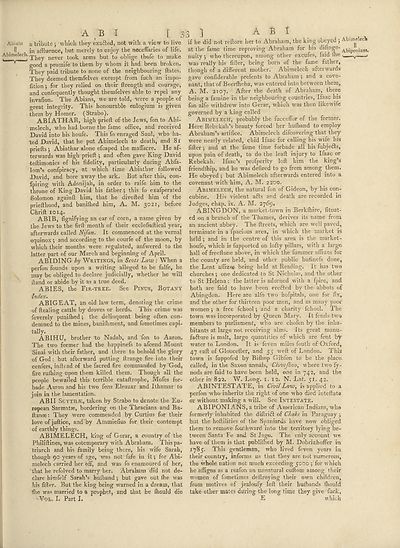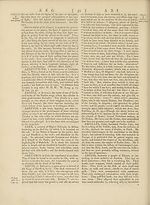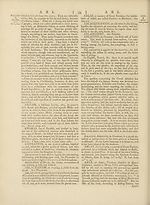Encyclopaedia Britannica, or, a Dictionary of arts, sciences, and miscellaneous literature : enlarged and improved. Illustrated with nearly six hundred engravings > Volume 1, A-AME
(51) Page 33
Download files
Complete book:
Individual page:
Thumbnail gallery: Grid view | List view

Abimelech. i
A B I [
Abians a tribute j which they exa&ed, not with a view to live
in affluence, but merely to enjoy the neceflaries of life.
They never took arms but to oblige thofe to make
good a promife to them by whom it had been broken.
They paid tribute to none of the neighbouring dates.
They deemed themfelves exempt from fuch an impo-
fition; for they relied on their ftrength and courage,
and confequently thought themfelves able to repel any
invafion. The Abians, we are told, Were a people of
great integrity. This honourable eulogium is given
them by Homer. (Strabo).
ABIATHAR, high pried of the Jews, fon to Ahi-
melech, who had borne the fame office, and received
David into his houfe. This fo enraged Saul, who ha¬
ted David, that he put Ahimelech to death, and 81
prieds j Abiathar alone efcaped the maflacre. He af¬
terwards was high pried •, and often gave King David
tedimonies of his fidelity, particularly during Abfa-
lotffis confpiracy, at which time Abiathar followed
David, and bore away the ark. But after this, con-
fpiring with Adonijah, in order to raife him to the
throne of King David his father 5 this fo exafperated
Solomon againd him, that he diveded him of the
priedhood, and banidied him, A. M. 3021, before
Chrid 1014.
ABIB, fignifying an ear of corn, a name given by
the Jews to the fird month of their ecclefiadical year,
afterwards called Nifan. It commenced at the vernal
equinox 5 and according to the courfe of the moon, by
which their months were regulated, anfwered to the
latter part of our March and beginning of April.
ABIDING bij Writings, in Scots Law : When a
perfon founds upon a writing alleged to be falfe, he
may be obliged to declare judicially, whether he will
dand or abide by it as a true deed.
ABIES, the Fir-tree. See Pinus, Botany
Index.
ABIGEAT, an old law term, denoting the crime
of dealing cattle by droves or herds. This crime was
feverely punilhed; the delinquent being often con¬
demned to the mines, banidmnent, and fometimes capi-
tally.
ABIHU, brother to Nadab, and fon to Aaron.
The two former had the happinefs to afcend Mount
Sinai with their father, and there to behold the glory
of God : but afterward putting drange fire into their
cenfers, indead of the facred fire commanded by God,
fire ruffling upon them killed them. Though all the
people bewailed this terrible catadrophe, Mofes for-
bade Aaron and his two fons Elea-zar and Ithamar to
join in the lamentation.
ABII Scyth/e, taken by Strabo to denote the Eu¬
ropean Sarmatae, bordering on the Thracians and Ba-
ftanae: They were commended by Curtius for their
love of judice, and'by Ammiefius for their contempt
of earthly things.
ABIMELECH, king of Gerar, a country of the
Philidines, was cotemporary with Abraham. This pa¬
triarch and his family being there, his wife Sarah,
though 90 years of age, wras not fafe in it \ for Abi¬
melech carried her off, and W7as fo enamoured of her,
that he refolved to marry her. Abraham did not de¬
clare himfelf Sarah’s huftand 5 but gave out die was
his fider. But the king being warned in a dream, that
ffie was married to a prophet, and that he fliould die
WoLc I. Part I.
] A B I
if he did not redore her to Abraham, the king obeyed ; AbiroelecTi
at the fame time reproving Abraham for his difinge- A^jp0nians#
nuity *, who thereupon, among other excufes, faid ffle w—^
was really his filler, being born of the fame father,
though of a different mother. Abimelech afterwards
gave confiderable prelents to Abraham ■, and a cove¬
nant, that of Beerffleba, was entered into between them,
A. M. 2107. After the death of Abraham, there
being a famine in the neighbouring countries, Ifaac his
fon alfo withdrew into Gerar, which was then likewife
governed by a king called
Abimet.ech, probably the fucceffor of the former.
Here Rebekah’s beauty forced her huffiand to employ
Abraham’s artifice. Abimelech difcovering that they
were nearly related, chid Ifaac for calling his wife his
fider; and at the fame time forbade all his fubje<9:s,
upon pain of death, to do the lead injury to Ifaac or
Rebekah. Ifaac’s profpertty lod him the king’s
friendfflip, and he was defired to go from among them.
He obeyed ; but Abimelech afterwards entered into a
covenant w'ith him, A. M. 2200.
Abimelech, the natural fon of Gideon, by his con¬
cubine. His violent afts and death are recorded in
Judges, chap. ix. A. M.
ABINGDON, a market-toivn in Berkdiire, fituat-
ed on a branch of the Thames, derives its name from
an ancient abbey. The ffreets, which are well paved,
terminate in a fpacious area, in which the market is
held ; and in the centre of this area is the market-
houfe, which is fupported on lofty pillars, with a large
hall of freedone above, in which the dimmer affixes for
the county are held, and other public bufinefs done,
the Lent affizas being held at Reading. It has two
churches ; one dedicated to St Nicholas, and the other
to St Helena: the latter is adorned with a fpire, and
both are faid to have been erefted by the abbots of
Abingdon. Here are alfo two hofpitals, one for fix,
and the other for thirteen poor men, and as many poor
women ; a free fchool; and a charity fchool. The
town was incorporated by Queen Mary. It fends two
members to parliament, who are chofen by the inha¬
bitants at large not receiving alms. Its great manu-
faflure is malt, large quantities of which are font by
water to London. It is feven miles fouth of Oxford,
47 ead of Glouceder, and 55 wed of London. This
town is fuppofed by Biffiop Gibfon to be the place
called, in the Saxon annals, Clovejhoo, where two fy-
nods are faid to have been held, one in 742, and the
other in 822. W. Long. 1. 12. N. Lat. 51. 42.
ABINTESTATE, in Civil Law, is applied to a
perfon who inherits the right of one who died intedate
or without making a will. See Intestate.
ABIPONIANS, a tribe of American Indians, who
formerly inhabited the didri<51: of Chahs in Paraguay ;
but the hodilities of the Spaniards have now obliged
them to remove fouthward into the territory lying be¬
tween Santa Fe and St Jago. The only account we
have of them is that publiffied by M. Dobrizhoffer in
1785. This gentleman, who lived feven years in
their country, informs us that they are not numerous,
the whole nation not much exceeding 5000 ; for which
he affigns as a reafon an unnatural cudom among their
women of fometimes dedroying their own children,
from motives of jealoufy led their hufflands diould
take ether mates during the long time they give fuck,
E which
A B I [
Abians a tribute j which they exa&ed, not with a view to live
in affluence, but merely to enjoy the neceflaries of life.
They never took arms but to oblige thofe to make
good a promife to them by whom it had been broken.
They paid tribute to none of the neighbouring dates.
They deemed themfelves exempt from fuch an impo-
fition; for they relied on their ftrength and courage,
and confequently thought themfelves able to repel any
invafion. The Abians, we are told, Were a people of
great integrity. This honourable eulogium is given
them by Homer. (Strabo).
ABIATHAR, high pried of the Jews, fon to Ahi-
melech, who had borne the fame office, and received
David into his houfe. This fo enraged Saul, who ha¬
ted David, that he put Ahimelech to death, and 81
prieds j Abiathar alone efcaped the maflacre. He af¬
terwards was high pried •, and often gave King David
tedimonies of his fidelity, particularly during Abfa-
lotffis confpiracy, at which time Abiathar followed
David, and bore away the ark. But after this, con-
fpiring with Adonijah, in order to raife him to the
throne of King David his father 5 this fo exafperated
Solomon againd him, that he diveded him of the
priedhood, and banidied him, A. M. 3021, before
Chrid 1014.
ABIB, fignifying an ear of corn, a name given by
the Jews to the fird month of their ecclefiadical year,
afterwards called Nifan. It commenced at the vernal
equinox 5 and according to the courfe of the moon, by
which their months were regulated, anfwered to the
latter part of our March and beginning of April.
ABIDING bij Writings, in Scots Law : When a
perfon founds upon a writing alleged to be falfe, he
may be obliged to declare judicially, whether he will
dand or abide by it as a true deed.
ABIES, the Fir-tree. See Pinus, Botany
Index.
ABIGEAT, an old law term, denoting the crime
of dealing cattle by droves or herds. This crime was
feverely punilhed; the delinquent being often con¬
demned to the mines, banidmnent, and fometimes capi-
tally.
ABIHU, brother to Nadab, and fon to Aaron.
The two former had the happinefs to afcend Mount
Sinai with their father, and there to behold the glory
of God : but afterward putting drange fire into their
cenfers, indead of the facred fire commanded by God,
fire ruffling upon them killed them. Though all the
people bewailed this terrible catadrophe, Mofes for-
bade Aaron and his two fons Elea-zar and Ithamar to
join in the lamentation.
ABII Scyth/e, taken by Strabo to denote the Eu¬
ropean Sarmatae, bordering on the Thracians and Ba-
ftanae: They were commended by Curtius for their
love of judice, and'by Ammiefius for their contempt
of earthly things.
ABIMELECH, king of Gerar, a country of the
Philidines, was cotemporary with Abraham. This pa¬
triarch and his family being there, his wife Sarah,
though 90 years of age, wras not fafe in it \ for Abi¬
melech carried her off, and W7as fo enamoured of her,
that he refolved to marry her. Abraham did not de¬
clare himfelf Sarah’s huftand 5 but gave out die was
his fider. But the king being warned in a dream, that
ffie was married to a prophet, and that he fliould die
WoLc I. Part I.
] A B I
if he did not redore her to Abraham, the king obeyed ; AbiroelecTi
at the fame time reproving Abraham for his difinge- A^jp0nians#
nuity *, who thereupon, among other excufes, faid ffle w—^
was really his filler, being born of the fame father,
though of a different mother. Abimelech afterwards
gave confiderable prelents to Abraham ■, and a cove¬
nant, that of Beerffleba, was entered into between them,
A. M. 2107. After the death of Abraham, there
being a famine in the neighbouring countries, Ifaac his
fon alfo withdrew into Gerar, which was then likewife
governed by a king called
Abimet.ech, probably the fucceffor of the former.
Here Rebekah’s beauty forced her huffiand to employ
Abraham’s artifice. Abimelech difcovering that they
were nearly related, chid Ifaac for calling his wife his
fider; and at the fame time forbade all his fubje<9:s,
upon pain of death, to do the lead injury to Ifaac or
Rebekah. Ifaac’s profpertty lod him the king’s
friendfflip, and he was defired to go from among them.
He obeyed ; but Abimelech afterwards entered into a
covenant w'ith him, A. M. 2200.
Abimelech, the natural fon of Gideon, by his con¬
cubine. His violent afts and death are recorded in
Judges, chap. ix. A. M.
ABINGDON, a market-toivn in Berkdiire, fituat-
ed on a branch of the Thames, derives its name from
an ancient abbey. The ffreets, which are well paved,
terminate in a fpacious area, in which the market is
held ; and in the centre of this area is the market-
houfe, which is fupported on lofty pillars, with a large
hall of freedone above, in which the dimmer affixes for
the county are held, and other public bufinefs done,
the Lent affizas being held at Reading. It has two
churches ; one dedicated to St Nicholas, and the other
to St Helena: the latter is adorned with a fpire, and
both are faid to have been erefted by the abbots of
Abingdon. Here are alfo two hofpitals, one for fix,
and the other for thirteen poor men, and as many poor
women ; a free fchool; and a charity fchool. The
town was incorporated by Queen Mary. It fends two
members to parliament, who are chofen by the inha¬
bitants at large not receiving alms. Its great manu-
faflure is malt, large quantities of which are font by
water to London. It is feven miles fouth of Oxford,
47 ead of Glouceder, and 55 wed of London. This
town is fuppofed by Biffiop Gibfon to be the place
called, in the Saxon annals, Clovejhoo, where two fy-
nods are faid to have been held, one in 742, and the
other in 822. W. Long. 1. 12. N. Lat. 51. 42.
ABINTESTATE, in Civil Law, is applied to a
perfon who inherits the right of one who died intedate
or without making a will. See Intestate.
ABIPONIANS, a tribe of American Indians, who
formerly inhabited the didri<51: of Chahs in Paraguay ;
but the hodilities of the Spaniards have now obliged
them to remove fouthward into the territory lying be¬
tween Santa Fe and St Jago. The only account we
have of them is that publiffied by M. Dobrizhoffer in
1785. This gentleman, who lived feven years in
their country, informs us that they are not numerous,
the whole nation not much exceeding 5000 ; for which
he affigns as a reafon an unnatural cudom among their
women of fometimes dedroying their own children,
from motives of jealoufy led their hufflands diould
take ether mates during the long time they give fuck,
E which
Set display mode to:
![]() Universal Viewer |
Universal Viewer | ![]() Mirador |
Large image | Transcription
Mirador |
Large image | Transcription
Images and transcriptions on this page, including medium image downloads, may be used under the Creative Commons Attribution 4.0 International Licence unless otherwise stated. ![]()
| Permanent URL | https://digital.nls.uk/193132648 |
|---|
| Attribution and copyright: |
|
|---|
| Description | Ten editions of 'Encyclopaedia Britannica', issued from 1768-1903, in 231 volumes. Originally issued in 100 weekly parts (3 volumes) between 1768 and 1771 by publishers: Colin Macfarquhar and Andrew Bell (Edinburgh); editor: William Smellie: engraver: Andrew Bell. Expanded editions in the 19th century featured more volumes and contributions from leading experts in their fields. Managed and published in Edinburgh up to the 9th edition (25 volumes, from 1875-1889); the 10th edition (1902-1903) re-issued the 9th edition, with 11 supplementary volumes. |
|---|---|
| Additional NLS resources: |
|

